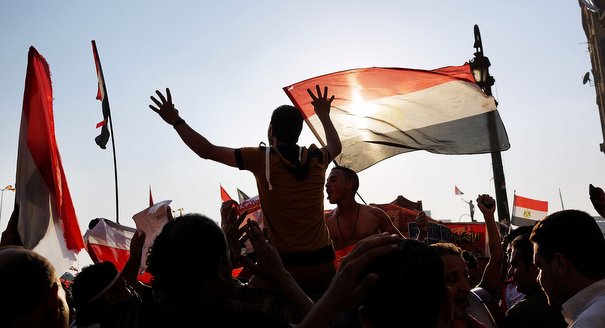Turkey’s recent troubles suggest it is on the upward curve not only economically, but politically as well. It will take time to sort things out: to strike the right balance between majority inclinations and minority rights; secularism and Islam; regional power ambitions and the relationship with the European Union. Personally I am confident that Turkey will make it. It will also emerge as a pivotal player in the region where important parts of Eurasia meet: the European Union to the west; the Arab world to the south and south-east; Iran, Central and South Asia to the east; and the Caucasus, Eastern Europe and Russia to the north.
Ironically, just as Alexey Malashenko was writing about secular protestors in Istanbul’s Taksim Square being an answer to Cairo’s Islamist Tahrir, Egypt has entered a new act of its evolving drama. Less than two and a half years after the revolution which overthrew the Mubarak regime, the million-strong crowds in Tahrir did it again. Critically supported by the army, they deposed the Muslim Brotherhood leadership of the Arab world’s biggest country, along with Egypt’s first democratically elected president, Mohammed Morsi.
Malashenko had seen it all coming already from a distance. It must have been clear to many others that the Brothers’ regime and Morsi personally were failing. When I last visited Cairo for a Carnegie-sponsored seminar in mid-February, I was struck by two things: the relatively civilized conversation among representatives of many political parties, from the liberals to the Brothers to the Salafis, on one hand, and the sheer inability of either the government or the opposition to come up with a credible plan for Egypt’s economic recovery on the other, without which no IMF aid could be forthcoming. As I was flying back from Cairo, I took away the picture of a huge nation walking straight toward an abyss.
Things have deteriorated since. While many people debate whether what happened in Cairo on July 3, 2013 was a coup or not—and I understand the practical implications of this seemingly academic discussion—I am troubled by the failure of the experiment of bringing Egypt’s Islamists into democratic politics, underlined by the arrests of not just the President, but the bulk of the Brotherhood’s leadership by the military. I am not much reassured by the army’s unwillingness to govern directly. My concern is rather that Egypt is spinning out of control and is becoming ungovernable. In Turkey, economic achievements nurture civic awakening; in Egypt, economic collapse leads to political chaos.
